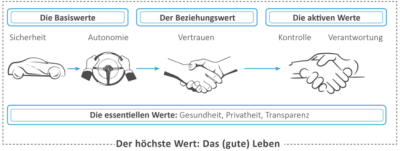Applying Ethics by Design in a Project on Highly Automated Driving
Results from the Research Project KoFFI

From November 2016 till January 2020 the Institute for Digital Ethics (IDE) was a partner in the inter- and transdisciplinary research project KoFFI "Cooperative Driver-Vehicle Interaction", funded by the German Federal Ministry of Education and Research (BMBF). As leader of the subproject ELSI, IDE was concerned with “Ethical, legal and social issues” of highly automated driving. As a central result the KoFFI-Code has been formulated: guidelines and a questionnaire for ethical self-assessment for highly automatd driving. The KoFFI guidelines and the questionnaire have been published in a collection on Smart Automotive Mobility, edited by Gerrit Meixner from Hochschule Heilbronn. In German, they can be downloaded here.
The international political and scientific developments that happened during the project duration make the project results even more relevant: amongst other things, the German Road Traffic Act was amended in 2017, the General Data Protection Regulation was implemented in 2018, and several recommendations have been published, such as the “Ethical rules for automated and connected vehicular traffic” by the Ethics Commission Automated and Connected Driving appointed by the Federal Minister of Transport and Digital Infrastructure, and the “Resolution on Data Protection in Automated and Connected Vehicles” of the 39th International Conference of Data Protection and Privacy Commissioners Hong Kong in 2017.
Overall, IDE' s contribution to KoFFI can be seen as a successfull attempt to implement ethics by design in a technology, as described by Petra Grimm and Julia Maria Mönig in the above mentioned collection, in the chapter "KoFFI - The New Driving Experience: How to Cooperate with Automated Driving Vehicles" (Rainer Erbach et al.). Tobias Keber and Judith Klink-Straub elaborate in the same chapter on data protection and other legal issues of automated driving.
That “implementing ethics” means a process and not a fixed result, can be seen by the fact that the focus of the values identified as important changed during the project duration. At the beginning of the project, the following values were deemed central (cf. also the Smart Mobility Matrix above): Security, Autonomy, Trust, Control, Responsibility, Health, Privacy, Transparency and (Good) Life. In the final guidelines out ot these, four were defined as quintessential: Privacy, Autonomy, Trust (in technology) and Transparency.
The questionnaire for ethical self-assessment consists of 44 questions that have been grouped into six topics: About the project, Dealing with involved persons, Design, Programming, Ethical evaluation and Possible future consequences of the invention and might also be used for in the research and innovation process of other - highly automated - technologies.
Furthermore, “5 ethical imperatives” were formulated to further motivate ethical reflection:
1. Do no harm!
2. Check that the system is fair!
3. Protect privacy!
4. Enable freedom of action and freedom of choice!
5. Ensure explainablity!
The project results at a glance can be found on the attached poster (in German), presented at the BMBF-conference “MTI für eine intelligente Mobilität: Verlässliche Technik für den Menschen”, 4.12.2019, Berlin.
In addition, framed by a study on enabling ethical reflection, students from the Audiovisual Media program at the Hochschule der Medien, directed, filmed, and produced the short film “StattLandFlucht”.
Autoren
Eingetragen von
Mehr zu diesem Autor
